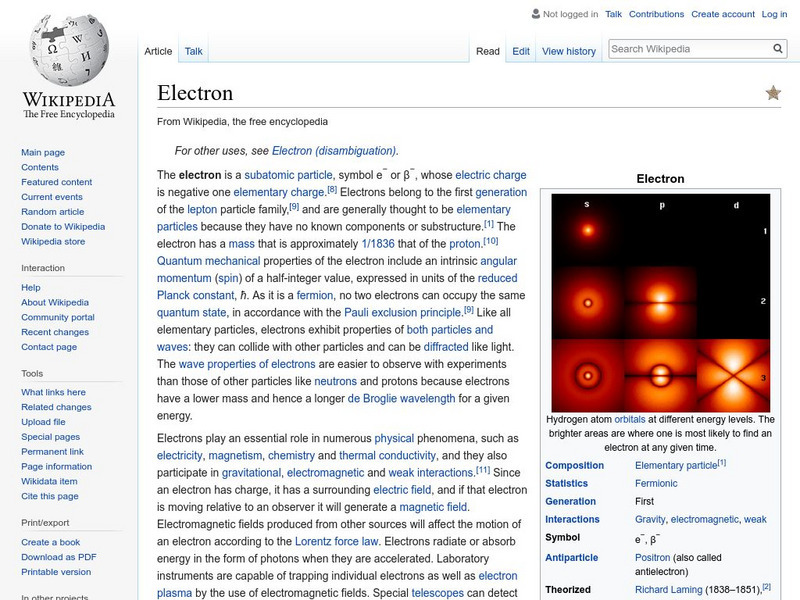Physics Classroom
The Physics Classroom: Negatively Charged Electroscope
From the Multimedia Physics Studios of the Glenbrook South High School. A tutorial containing a simple animation demonstrating the grounding process for a negatively-charged electroscope. The movement of electrons between the...
Frostburg State University
General Chemistry Online: Discovery of the Electron
This site from General Chemistry Online of the Frostburg State University provides an explanation of Thomson's discovery of the electron using a cathode ray tube and also his plum cake model of the atom.
McGraw Hill
Online Learning Center: Electric Potential and Capacitance
A series of pages which define key terms and explain basic concepts related to electric potential. Includes a set of practice problems with answers and solutions.
Science4Fun
Science4 Fun: What Is Atom
Fun and interesting illustrated information on atoms including composition, elements, and history.
California State University
California State University: Proton, Electron, Neutron
An interesting and useful tool to practice recognition/calculation of atomic number, mass, and number of neutrons, electrons, etc. Can be used with all elements.
Math Science Nucleus
Math/science Nucleus: Electrons and the Hairy Monster
This animation discusses electrons and the properties of electrons in a storybook format featuring hairy monsters, strange rocks, and fun animations.
Wolfram Research
Wolfram Science World: Phillipp Lenard
This site from ScienceWorld mostly describes Lenard's most notable scientific discoveries and contributions. Includes minimal biographical information and links to additional information on related subjects.
Other
Chemtopics: Understanding the Schrodinger Eqn.
The Schrodinger equation specifies atomic orbitals which are occupied by an electron. Quantum numbers can identify a unique energy level for each electron (set up in a PowerPoint presentation).
Wikimedia
Wikipedia: Electron
At this Wikipedia site, properties and characteristics of electrons are discussed in this brief overview of them.
Curated OER
Isoelectronic Series
Acting as a subtopic of the General Chemistry Virtual Textbook's section on Atoms and the Periodic Table, this site discusses the properties of the atoms individually in relation to the main group elements of the Periodic Table.
Curated OER
Electron Affinities Periiodic Trends
Acting as a subtopic of the General Chemistry Virtual Textbook's section on Atoms and the Periodic Table, this site discusses the properties of the atoms individually in relation to the main group elements of the Periodic Table.









